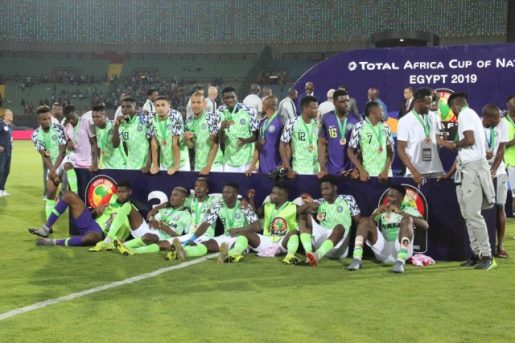Gernot Rohr’s Super Eagles confronts Sierra Leone in two Africa Cup of Nations’ Group L qualifying games in the coming days. Nigeria is clearly a favorite to qualify from the group, ahead of Togo, Sierra Leone, and Lesotho.
For some, therefore, this should be a time to dwell on Nigeria’s journey to yet another AFCON qualification. To dwell? Possibly. But the fact is that AFCON qualification is not the real test for Gernot Rohr and Nigeria. The test is bigger than mere qualification for the AFCON.
Instead, the test is of and about history. Where does and will Gernot Rohr and his Nigerian team rank in Nigeria’s pantheon of greatness?
Right now, the answer is that Rohr and his Nigerian team are far from greatness. Ranking not considered! Jury still awaiting future results. Rohr’s team will hardly be recognizable to even rub shoulders among Nigeria’s greats. Thus, the November contests with Sierra Leone are mere markers towards a race with destiny and consideration.

Qualification for the next AFCON is not how Rohr’s success or failure is and will be measured. Instead, he will be evaluated based on the progress of the team in competition with elite teams both in Africa and the world. That measure clearly is not at the qualifying stage but in trophies that Nigeria wins, at least when the conversation is about the AFCON.
Of course, the World Cup is an entirely different proposition. At the World Cup, qualification signifies a certain level of accomplishment considering the fact that only five African teams can get there in each competition year.
So far, Gernot Rohr has not done much to be considered one of the country’s revered managers. There is nothing that he has accomplished so far that Clemens Westerhof, Stephen Keshi, or Shuaibu Amodu have not done. Check World Cup qualification and check AFCON accomplishment.
In fact, both Westerhoff (1994) and Keshi (2013) won the AFCON. Winning the AFCON is not yet on Rohr’s resume. Westerhoff (1994) and Keshi (2014) progressed to the last 16 of the World Cup. Amodu qualified for two World Cups (2006 and 2010) and finished third two times at the AFCON (2006 and 2010).
Rohr qualified for one World Cup (2018) and finished third at an AFCON (2019). Rohr has yet to match the accomplishments of each of those coaches. In essence, Rohr has done nothing to rank ahead of the three.
Then Otto Gloria won the AFCON (1980) and Onigbinde (1984) took second place at the AFCON. Rohr has only placed third at the AFCON. In fact, there are several other coaches who have coached Nigeria beyond an AFCON third place finish and yet another that took Nigeria to a final 16 at the World Cup. All these managers have a Nigerian resume unmatched by Rohr.
In the end, it is Rohr’s ability to match or achieve more that will determine his place among the accomplished managers ever to manage Nigeria.
_______________________________________
Nigeria’s Cross-Sectional FIFA Rank Since 1992
_______________________________________
Month Year FIFA Rank
_______________________________________
December 1992 13
November 1995 24
November 1998 65
November 2001 40
November 2004 21
November 2007 20
November 2010 33
November 2013 36
November 2016 50
November 2019 31
October 2020 32
_______________________________________
Recently, some have argued that Gernot Rohr took over a flailing team and improved Nigeria to raring height in terms of FIFA ranking. But what height, really? A snapshot of data (using largely the month of November every third year since 1992 when FIFA began its ranking system) shows that the team’s rank of 50 under Rohr is not remarkable.
While it is true that Rohr has improved the team’s ranking since the nosedive just before he arrived, it is important to put the reasons for that dive in prosper perspective. The failures to reach two AFCON tournaments before Rohr’s arrival were clearly attributable to protracted battle between the NFF and the then Manager Keshi and then Manager Sunday Oliseh’s sudden and shoddy departure on the eve of a critical 2012 AFCON qualifier against Egypt that left the team in tatters. Those two major upheavals account for the failures to reach two AFCON finals.
Importantly, the relatively good working relationship between Manager Rohr and the NFF has returned Nigeria to routine qualification to the AFCON tournament. That largely has also been reflected in Nigeria’s incline in the FIFA ranking.
Nigeria deserves more. Given Nigeria’s pedigree, the goal is not merely qualifying for the AFCON or the World Cup but winning the former and going beyond the second round of the latter. Presently, Rohr has not delivered either of those. The reality is that his latest contract to manage the team should be, realistically, an expectation to deliver both.
Thus, the contests against Sierra Leone should be seen as steps in a long journey to reach important milestones – winning the AFCON and reaching at the least a final 8 at a World Cup. Anything short of those, particularly with the accolades received for the squad that he has put together must be and should be considered a shortcoming.









